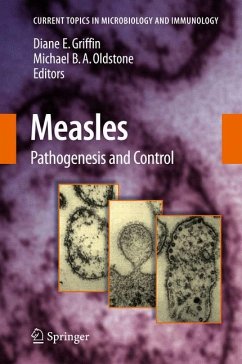
Bacterial Activation of Type I Interferons (eBook, PDF)
Versandkostenfrei!
Sofort per Download lieferbar
72,95 €
inkl. MwSt.
Weitere Ausgaben:

PAYBACK Punkte
36 °P sammeln!
The type I interferon (IFN) signaling pathway is well recognized as a pathway activated by viral infections. It is activated by a variety of microbial pattern recognition receptors including the Toll-like receptors, NOD-like receptors and several cytosolic receptors. Activation of the type I IFN pathway leads to the production of both antiviral factors and products that influence immune cell function. More recently it has been shown that bacteria are also capable of activating this pathway.Bacterial Activation of Type I Interferons reviews both the current understanding of how different bacter...
The type I interferon (IFN) signaling pathway is well recognized as a pathway activated by viral infections. It is activated by a variety of microbial pattern recognition receptors including the Toll-like receptors, NOD-like receptors and several cytosolic receptors. Activation of the type I IFN pathway leads to the production of both antiviral factors and products that influence immune cell function. More recently it has been shown that bacteria are also capable of activating this pathway.
Bacterial Activation of Type I Interferons reviews both the current understanding of how different bacterial species are able to activate this pathway as well as the influence type I IFNs have on the outcome to infection. Several different bacterial species are covered, spanning Gram positive and Gram negative, intracellular, extracellular, and different host infection sites. An introduction to the pathogenesis of each organism is provided, and the signaling molecules involved in the activation of the type I IFN pathway and the role it plays in animal infection models are also covered.
Bacterial Activation of Type I Interferons reviews both the current understanding of how different bacterial species are able to activate this pathway as well as the influence type I IFNs have on the outcome to infection. Several different bacterial species are covered, spanning Gram positive and Gram negative, intracellular, extracellular, and different host infection sites. An introduction to the pathogenesis of each organism is provided, and the signaling molecules involved in the activation of the type I IFN pathway and the role it plays in animal infection models are also covered.
Dieser Download kann aus rechtlichen Gründen nur mit Rechnungsadresse in A, B, BG, CY, CZ, D, DK, EW, E, FIN, F, GR, HR, H, IRL, I, LT, L, LR, M, NL, PL, P, R, S, SLO, SK ausgeliefert werden.













